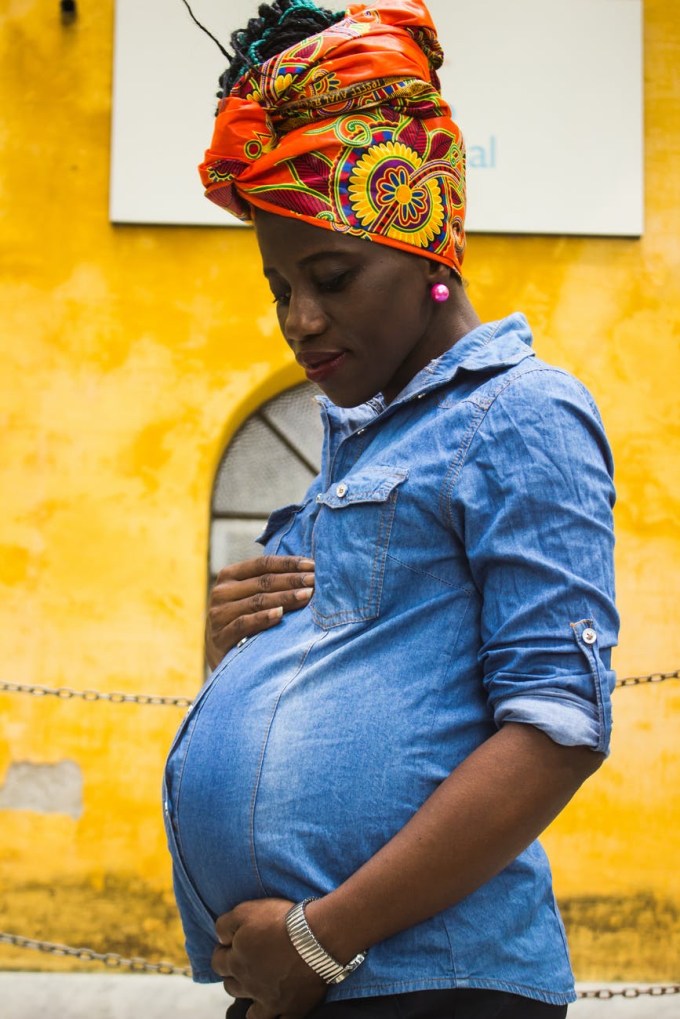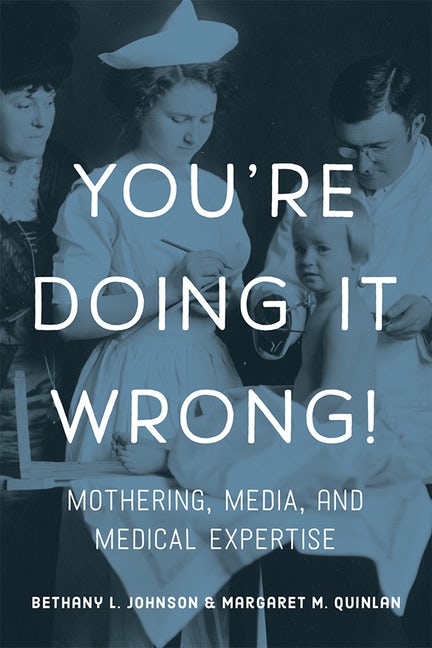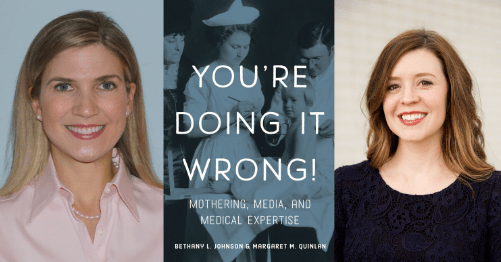
You’re doing it wrong. I’m sure to some capacity, we have all heard or have felt this way before. Family, friends, and even strangers online, make comments regarding the way we live our lives, our choices, our parenting styles. It’s difficult to know if we’re doing things “correctly.” We’re bombarded with tips, advice, information, and opinions now more than ever before. It’s confusing and overwhelming especially as a mom. Moms are judged so harshly. I’ve felt the pressure of making a “bad decision”, felt the weight of the world when choosing what’s best for my family and myself, and I’ve had to endure unsolicited advice and judgement no matter what I did. But this pressure wasn’t unique to parenthood, in fact, it started when I was trying to conceive. Getting pregnant wasn’t easy for me. But perhaps what made it more challenging were the misconceptions, stigmas, shame, and the overload of information regarding infertility especially when it came to women and their bodies.
Authors Bethany L. Johnson and Margaret M. Quinlan, a medical historian and a communications studies professor, recently published You’re Doing it Wrong! Mothering, Media, and Medical Expertise. Their book “…investigates the storied history of expertise around mothering in the media, from the newspapers, magazines, doctors’ records and personal papers of the nineteenth century to today’s websites, Facebook groups, and Instagram feeds. Johnson and Quinlan find surprising parallels between today’s mothering experts and their Victorian counterparts, but they also explore how social media has placed unprecedented pressures on new mothers wrestling with familiar concerns and crises from pre-conception through early toddlerhood.”

I was able to interview Quinlan over the phone and Johnson via email. We discussed the complicated world of infertility. Our conversation has been edited and condensed.
Singh: How is infertility perceived differently for women than men?
Quinlan: There’s this perception that men are emotionally fragile and many can’t or won’t handle the diagnosis of infertility [well]. Doctors used to just conspire with wives to lie to their husbands, or [some doctors would] lie to both of the patients by using donor sperm without their knowledge [though this is rare today]. We’ve interviewed patients who don’t even share sperm analysis results with their partners and just take on the most intensive and invasive treatments instead. There is one case in which this knowledge was only revealed to the male partner in a courtroom during a very public divorce case in the early 20th century. It made the news when he found out the child wasn’t his. A lot of the testing is done on the women’s bodies, and those tests are more invasive from an anatomical perspective, though today most clinics require sperm analysis—there are [still] men who refuse even to be tested, though they make up 35-40% or more of the equation. But there are still instances where women, or individuals who identify as female, would say ‘they never tested my husband/partner.’

Singh: You mentioned “hyper-fertile” in the book. Can you explain that?
Quinlan: There are a lot of myths around race and infertility like the idea that people or women of color are supposed to be hyper-fertile, and this myth is well over 200 years old. In fact, African-American women, in particular, are more likely to be infertile. And so, when they are infertile, there is a lot of silence and shame around it. Dr. Matrika Johnson at the local REI clinic REACH has spoken publicly about this silence and how it stalls the start of treatment, sometimes past when treatment could really be helpful. We’ve worked with Fertility For Colored Girls and have written about Broken Brown Egg to raise awareness to the fact that this is such a myth. Women of color have higher infertility rates, but society is not talking about that as much as we should.
Singh: You mentioned in the book that words we used in the past for infertility like “barren” and “sterile” and you noted that those terms are “confusing and disempowering”.
Quinlan: One thing that’s really important to Bethany and me is the language that we use to discuss infertility because [in most cases] it places the blame on an individual or more often [the female body]. For instance, the myth that being a mother is “supposed” to be “natural” so when it doesn’t come naturally, there’s a lot of shame and stigma connected with that language. There’s an archaic medical term called incompetent cervix which can lead to miscarriages and premature birth yet we would never [say a man has] an incompetent penis.

Singh: Do you think that social media has had more of a positive effect on the way we perceive infertility in general?
Quinlan: In my heart, as an optimist, Bethany and I have talked about the ways social media is empowering for individuals especially raising awareness to crises new parents face. But we are always wary where someone places blame on an individual or has a quick fix for infertility. And there are still myths floating around like “just have a glass of wine” or “just relax” or “go on vacation.” That’s really frustrating for us because just relaxing is not going to take away the scar tissues on a fallopian tube and it’s not going to fix a lot of the other causes of infertility either. We all know someone who started the adoption process and then got pregnant but those chances are so slim [the highest we’ve found is a 5% chance], yet those stories are so powerful and they give people false hope. So, Bethany and I are passionate about supporting people throughout the process of infertility and sometimes sharing stories or medical advice [on social media] can do more harm than not.
Singh: Why do you think the “just relax” advice is still so common? My doctor also told me that and relaxing didn’t help with my infertility because I had PCOS, although I didn’t know it at the time.
Quinlan: Some doctors still buy into that myth [that certain women, such as women of color, are hyper-fertile]. I was even told to “just relax” too. I’m a type-A and a very anxious person. At the time, I wasn’t married and had finished my PhD and I was in my thirties and I kept feeling all this pressure that I was close to advanced maternal age. I told my OBGYN that I was really nervous about the potential of fertility issues because I was studying it and I had a lot of friends who were having fertility issues. My doctor told me “Oh you girls. All you do is do whatever you can not to get pregnant and as soon as you want to become pregnant you can’t.”
I was in shock. And he said he wouldn’t worry about me until I was forty. There is also the infantilization of women by traditional medicine, and the unwillingness of doctors to take female pain seriously, so medical history tells us that women are already at a disadvantage when they try to express their concerns. It is still common to hear “just relax.” Bethany and her partner were in treatment for four years, had multiple surgeries and treatments, but when she initially brought up her concerns with her [female] gynecologist, she was told to “just relax and have a bottle of wine. It will happen!” It didn’t work that way. There’s a woman who was still struggling to conceive at fifty years old and she found out that she was going through early menopause as a teen, I believe as young as twelve years old. And I thought, why didn’t they freeze her eggs or something [earlier]? With infertility, there are usually signs for a long time before, like with PCOS. We’re missing the steps to diagnosis or detect this quicker. That’s something primary care doctors should be trained in and look out for; however, we don’t want to talk about teens having sex which is ironic since we are expected to be mothers.
Singh: A lot of fertility issues and the health issues connected with them affect way more than trouble getting pregnant. I have PCOS and I have to worry about other health issues like diabetes. Yet doctors don’t look out for that until you have trouble getting pregnant. Even if a woman doesn’t want to have children, knowing about certain conditions like this as early as possible is still important. Why is this not happening?
Quinlan: It’s not just doctors [e.g., primary care, OBGYN] doing this. There’s a whole market based on this assumption that women are “natural” mothers and women of color are hyper-fertile. There are phone apps [that are marketed] to women who don’t have access to expensive fertility treatments or resources. A lot of these services or lay experts place the responsibility or blame on the women. Like, take an e-course to get your mind right. It preys on people without access to infertility treatments. So that’s troubling. We still blame the female body when their body doesn’t work “correctly.” We also see a lot of tension between “alternative” and “traditional” methods, but we think this misses the complexity of the issue. Sure, there is some research that points to a healthy diet positively impacting help. But will cutting out caffeine and sugar open occluded fallopian tubes? This seems highly unlikely. So, when we frame infertility as a “poor lifestyle” issue when there are already structural hurdles to overcome (e.g., T-shaped uterus, etc.) we set people up for disappointment and shame. That isn’t to say we only support one kind of methodology or treatment plan—that isn’t our area. The point is that we need to make sure everyone has access to the full gamut of supportive diagnostic tools and treatments.
Singh: There’s a lot of information and studies that suggest that women who struggled to become pregnant have a higher risk for postpartum depression and other postpartum mood disorders and they are less likely to reach out for help.
Quinlan: Yes, we talk a lot about the stress with being infertile. You’ve already been through so much like social isolation, marital stress, financial stress, and so we don’t [as a society] support women through that and so if they are able to have children those issues don’t just go away. And so, we definitely see a big connection because your body has been through so much hormonally and emotionally. The way women and men are treated and viewed by doctors is so different and infertility for women isn’t viewed by many doctors as serious. Some of our participants have talked about how all of a sudden they become a mother and they felt unsupported in that next phase and they think maybe they weren’t supposed to be mothers. We want women to be mothers but we don’t support them when they become mothers. I mean we have the worst maternity/family leave policies in the United States. The US also has the worst maternal death rate in the industrialized world, and it has been consistently on the rise since 1982. If we really valued childbearing and childrearing, women wouldn’t be dying like this. We need to stop lauding motherhood and refusing to support caretakers of newborns, babies and toddlers. We weaponize motherhood against mothers—motherhood is used as a political pawn. Like, the ideal mother is one we see on social media who is heterosexual, white, wealthy, skinny and able-bodied. We say that we support women but again, women are dying especially African-American women, who are dying at a rate 400% higher than white women from birth to the first six weeks postpartum.
I had to get off of social media. We scroll through all of these women who are mothers who are accomplished, successful, and happy. We see images of non-white mothers who are single or who feeds their child toxins or isn’t finically stable. The way individuals are portrayed on social media sets the standards too high or impossible for anyone to live up to. Thankfully we see more people sharing the difficulties and crises. Some women are sharing their infertility journey and tips on how to do the shots, relieve pain and some even send each other care packages. A lot of people turn to social media because they lack that support in their face-to-face life. If your child is sick at 3 in the morning and the doctors office is closed and you are trying to figure out if this rash is worth a trip to the ER. So, people post to social media and ask for help.
Singh: Is there anything you wanted to close with?
Quinlan: I wanted to touch on the “you’re doing it wrong” aspect. You’re receiving medical expertise or advice from a yoga instructor, a woman who sells Shakeology, a mother of six and acupuncturist or your doctor saying “don’t eat toxins” or “just relax.” We just have so much access to different voices which sometimes is positive because I can ask for a recommendation for a bottle for my son and that’s great. But instead of fixing the medical system and testing men earlier or not waiting until a failed infertility treatment, or maybe not just saying “you’re not eating right” or “you’re not relaxing” or in the right frame of mind. It puts the blame on women like they are too stressed at work or they are doing something wrong instead of having medical support.
To purchase You’re Doing it Wrong! Mothering, Media, and Medical Expertise click here. Use promo code: 02AAAA17 for 30% off.
For more:
Twitter: https://twitter.com/JQ_Research
Facebook: https://www.facebook.com/JohnsonQuinlanResearch/
Instagram: https://www.instagram.com/johnsonquinlanresearch/
Website: https://johnsonquinlanresearch.com








